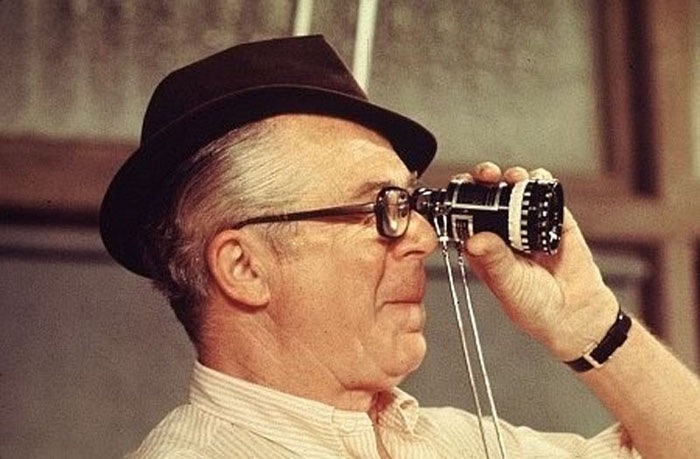
Courtesy of Taste of Cinema
Among the great writer and director talents of the classical Hollywood era, Billy Wilder has a legacy of unique storytelling prowess.
“People forget who he is and how important he was and how much he achieved,” Film and Media Studies Chair Matthew Berstein said in an interview with the Wheel. Bernstein, the Goodrich C. White professor of Film and Media Studies, along with Associate Professor of Art History Todd Cronan co-teach a class, FILM 391R Studies in Major Figures, on the career and films of Wilder and have centralized Wilder’s work in this semester’s Cinematheque Film Series.
Each semester, the Film and Media Studies Department showcases a collection of movies, with weekly screenings completely free and open to both Emory students and the general public. The series is often part of a required viewing for a respective course — this semester for Bernstein and Cronan’s aforementioned class. Each week, the two professors give an introduction to Wilder’s best movies and contextualize the specific film, informing viewers what they might want to pay attention to without spoiling the plot. They present the movies on the big screen; even bringing some to life in 35mm for an excellent collective viewing experience. The screening of the silent film “Forbidden Paradise” was particularly impressive. The film was so hard to find that the professors borrowed a print from the Museum of Modern Art in New York, and they also brought in phenomenal live accompanist Donald Sosin to play his score for the film.
The series began with three films by the famous director Ernst Lubitsch: “To Be or Not to Be,” “Forbidden Paradise” and “Ninotchka,” a remarkable romantic comedy written by Wilder. Although the first three films were not directed by Wilder, they were included because of the profound influence Lubitsch’s filmmaking had on him. Cinematheque Series followed this trio of films with Wilder’s genre-defining noir thriller “Double Indemnity” on September 18th and will continue with some of his great classics including “Sunset Boulevard” and “Some like it Hot,” as well as lesser known works of his such as “Stalag 17” and “One, Two, Three.” Bernstein particularly recommended not to miss “A Foreign Affair” and “Ace in the Hole.”
The series as a whole is comprised of many iconic films emblematic of Wilder’s talent, while also providing an enjoyable and captivating theatrical experience; after all, Wilder’s career is often considered to be defined by the noir and romantic comedy genres, lending the series ample wit and plenty of thrills. Bernstein points to Wilder’s unique perspective as an “outsider,” a Jewish exile from Germany during the Holocaust, as a source of Wilder’s wit and his observant nature that forms the basis for his unique storytelling perspective and the trying situations that his characters cope with.
“His vantage point is apparent in several aspects of his films, most notably in his decision to focus on protagonists who are themselves outsiders,” Bernstein said. “In doing so, they expose harsher realities of American society as well as their own venality.”

Urvi Agarwal/ Staff
To Bernstein, Wilder’s films are, at their core, about characters facing “major moral dilemmas” who are forced to come to terms with being seduced by their own worst instincts, often more hypocritical or intense than Wilder’s contemporaries like Lubitsch would portray.
Wilder, for many reasons, ought to be reexamined. From his excellent perspective to his mastery of mise en scene to his use of iconic Hollywood stars in roles that play with the idea of their social image, it’s no wonder that Wilder has solidified his place among the incredible directors that have enriched Hollywood’s film industry. But Wilder’s legacy aside, the collective experience of the theatrical viewing should be a strong enough pull for this spectacular lineup of movies.
“The magic of seeing a film together and experiencing a film together, especially a comedy, cannot be beat,” Bernstein said.
Whether going to the Cinematheque alone or going with friends, the theater is always full of audiences ready to share a laugh at films like “Some Like it Hot,” to thrill at the debauchery of “Sunset Boulevard” and to make each viewing special. Seats fill up quickly, so anyone who is interested should try to arrive early.
The free Cinematheque screenings happen every Wednesday at 7:30 p.m. for students, faculty and general audiences in White Hall 208.
Rhett Hipp (22C) is from Winter Park, Florida, majoring in film and media studies, creative writing and Japanese language and culture. Along with writing for the Wheel, Hipp is the current vice president of Emory’s Japanese Cultural Club. He reviews films, games and anime. Contact Hipp at rhett.hipp@emory.edu.





